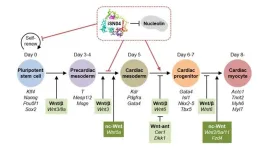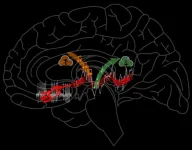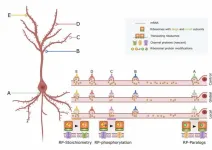(Press-News.org) COLUMBUS, Ohio – In our increasingly polarized society, more people may find themselves in a workplace where they are one of the few conservatives or few liberals around.
A new study found that those whose values – political or otherwise – don’t match the majority in their organization felt they received less respect and as a result were less engaged at work. Moreover, their co-workers noticed their lack of engagement.
“It is a real issue that organizations face,” said Tracy Dumas, lead author of the study and associate professor of management and human resources at The Ohio State University’s Fisher College of Business.
“Organizations know that it is valuable to have employees with different perspectives. But if those with different perspectives feel they aren’t respected and so aren’t fully participating in their jobs, organizations aren’t fully reaping the benefits of their unique perspectives.”
But the study did find a way that “value minorities” could feel more a part of their teams: by disclosing personal information about themselves to their colleagues that had nothing to do with the values about which they disagreed.
The study was published recently in the journal Organization Science.
“Value minorities” were defined as those whose core beliefs involving politics, religion or other important areas of life clash with the majority of people in their organizations.
Dumas emphasized that the study examined values, not opinions. Values can inform opinions, but values are harder to change because they are embedded in the person’s sense of self – they transcend individual issues.
The researchers conducted studies among full-time adult employees in an online setting, a student project group that worked together over a semester, and undergraduate students in the laboratory, all with similar results.
The study of 389 full-time workers was conducted online. Participants read a workplace scenario where they imagined themselves working closely with colleagues of the same rank on a workgroup.
Some were told that their values clashed with co-workers on issues like communal responsibility, individual liberty, and safety and security. Others were told their values were similar.
To get at the importance of self-disclosure, some were told they often talked with colleagues about non-work topics like what they did over the weekend, including spending time with a friend, trying a new restaurant in town and talking about their favorite things on the menu.
Others were told that they rarely discussed personal topics and usually only talked about work. Both groups were told they did not discuss their personal values.
All participants then reported if they felt their colleagues would respect them on a scale of 1 (strongly disagree) to 7 (strongly agree).
Participants were then told about an important group meeting coming up in which they would be discussing how to secure a new and important client. Participants rated how much they believed they would be engaged in the meeting through statements like “I would exert my full effort” and “My mind would be focused while completing work in my group.”
The results showed the importance of self-disclosure in helping value minorities perform better in the workplace, Dumas said.
Those in the minority who were told that they shared information about their personal life – such as what they did over the weekend – anticipated feeling more engaged than those value minorities in the non-disclosure condition.
Self-disclosure helped boost engagement among value minorities by increasing the respect they anticipated from their colleagues, the results showed.
Similar results were found among 277 undergraduate students working in real-life teams who were surveyed three times in a seven-week period over one semester. They were surveyed about their values, and how much they felt their values clashed with others on their team. They also reported on the respect they felt from others on their teams and how much they talked about themselves.
All the findings revealed in the lab experiment were also found in this real-life work group.
One key here was that team members rated how engaged each person was on their team project.
“We found that others on the team noticed that people whose values clashed with the majority didn’t engage as much in the work of the group,” Dumas said. “But that negative effect was lessened if the value minorities talked about themselves in the group.”
The key in all the studies was the importance of people talking about themselves in the workplace – not about areas where they disagree, but just about their everyday life experiences.
“What happens is that when people talk about themselves, they feel more respected – and they feel invested in the success of the group, they feel engaged,” she said.
Dumas said self-disclosure helps because it “humanizes” value minorities to the group.
People may feel uncomfortable being a part of a work group that doesn’t share their values, she said. But if they pick out something they do feel comfortable sharing with the group, it can create a connection.
“When you talk about your family or the movies you like or what you did this week, it shows you’re a whole person, you’re not just defined by the difficult areas where you disagree,” she said.
“Even if you don’t agree with others on your favorite movies, or what restaurants you like, that’s not a difficult conversation to have.”
One of the best parts of using self-disclosure to help value minorities feel more respected and engaged in the workplace is that they don’t need any management intervention to make it happen.
“If you’re a value minority, you’re not at the mercy of your manager to make things better. Self-disclosure is a step that you can take to mitigate the negative effects of feeling that you’re in the minority,” Dumas said.
Importantly, however, the paper notes the importance of organizations creating an environment where people feel comfortable disclosing.
Dumas conducted the study with Robert Lount, professor of management and human resources at Ohio State’s Fisher College, and Sarah Doyle, who received her PhD at Ohio State’s Fisher College and is now an assistant professor at the University of Arizona.
COLUMBUS, Ohio – In our increasingly polarized society, more people may find themselves in a workplace where they are one of the few conservatives or few liberals around.
A new study found that those whose values – political or otherwise – don’t match the majority in their organization felt they received less respect and as a result were less engaged at work. Moreover, their co-workers noticed their lack of engagement.
“It is a real issue that organizations face,” said Tracy Dumas, lead author of the study and associate professor of management and human resources at The Ohio State University’s Fisher College of Business.
“Organizations know that it is valuable to have employees with different perspectives. But if those with different perspectives feel they aren’t respected and so aren’t fully participating in their jobs, organizations aren’t fully reaping the benefits of their unique perspectives.”
But the study did find a way that “value minorities” could feel more a part of their teams: by disclosing personal information about themselves to their colleagues that had nothing to do with the values about which they disagreed.
The study was published recently in the journal Organization Science.
“Value minorities” were defined as those whose core beliefs involving politics, religion or other important areas of life clash with the majority of people in their organizations.
Dumas emphasized that the study examined values, not opinions. Values can inform opinions, but values are harder to change because they are embedded in the person’s sense of self – they transcend individual issues.
The researchers conducted studies among full-time adult employees in an online setting, a student project group that worked together over a semester, and undergraduate students in the laboratory, all with similar results.
The study of 389 full-time workers was conducted online. Participants read a workplace scenario where they imagined themselves working closely with colleagues of the same rank on a workgroup.
Some were told that their values clashed with co-workers on issues like communal responsibility, individual liberty, and safety and security. Others were told their values were similar.
To get at the importance of self-disclosure, some were told they often talked with colleagues about non-work topics like what they did over the weekend, including spending time with a friend, trying a new restaurant in town and talking about their favorite things on the menu.
Others were told that they rarely discussed personal topics and usually only talked about work. Both groups were told they did not discuss their personal values.
All participants then reported if they felt their colleagues would respect them on a scale of 1 (strongly disagree) to 7 (strongly agree).
Participants were then told about an important group meeting coming up in which they would be discussing how to secure a new and important client. Participants rated how much they believed they would be engaged in the meeting through statements like “I would exert my full effort” and “My mind would be focused while completing work in my group.”
The results showed the importance of self-disclosure in helping value minorities perform better in the workplace, Dumas said.
Those in the minority who were told that they shared information about their personal life – such as what they did over the weekend – anticipated feeling more engaged than those value minorities in the non-disclosure condition.
Self-disclosure helped boost engagement among value minorities by increasing the respect they anticipated from their colleagues, the results showed.
Similar results were found among 277 undergraduate students working in real-life teams who were surveyed three times in a seven-week period over one semester. They were surveyed about their values, and how much they felt their values clashed with others on their team. They also reported on the respect they felt from others on their teams and how much they talked about themselves.
All the findings revealed in the lab experiment were also found in this real-life work group.
One key here was that team members rated how engaged each person was on their team project.
“We found that others on the team noticed that people whose values clashed with the majority didn’t engage as much in the work of the group,” Dumas said. “But that negative effect was lessened if the value minorities talked about themselves in the group.”
The key in all the studies was the importance of people talking about themselves in the workplace – not about areas where they disagree, but just about their everyday life experiences.
“What happens is that when people talk about themselves, they feel more respected – and they feel invested in the success of the group, they feel engaged,” she said.
Dumas said self-disclosure helps because it “humanizes” value minorities to the group.
People may feel uncomfortable being a part of a work group that doesn’t share their values, she said. But if they pick out something they do feel comfortable sharing with the group, it can create a connection.
“When you talk about your family or the movies you like or what you did this week, it shows you’re a whole person, you’re not just defined by the difficult areas where you disagree,” she said.
“Even if you don’t agree with others on your favorite movies, or what restaurants you like, that’s not a difficult conversation to have.”
One of the best parts of using self-disclosure to help value minorities feel more respected and engaged in the workplace is that they don’t need any management intervention to make it happen.
“If you’re a value minority, you’re not at the mercy of your manager to make things better. Self-disclosure is a step that you can take to mitigate the negative effects of feeling that you’re in the minority,” Dumas said.
Importantly, however, the paper notes the importance of organizations creating an environment where people feel comfortable disclosing.
Dumas conducted the study with Robert Lount, professor of management and human resources at Ohio State’s Fisher College, and Sarah Doyle, who received her PhD at Ohio State’s Fisher College and is now an assistant professor at the University of Arizona.
END
How to cope when your values clash with your co-workers’
Study finds some types of self-disclosure can help
2023-10-10
ELSE PRESS RELEASES FROM THIS DATE:
Source of electron acceleration and X-ray aurora of Mercury ̶ local chorus waves detected
2023-10-10
Background
Since Mercury is the closest planet to the Sun among the solar system planets, it is strongly influenced by the solar wind, a high-speed (several hundred km/s) stream of plasma blowing from the Sun. Explorations of Mercury was first carried out by the Mariner 10 spacecraft in 1974 and 1975, which revealed that Mercury has a magnetic field, and thus a magnetosphere, similar to that of Earth. In the 2000s, the MESSENGER spacecraft provided a detailed picture of the Mercury's magnetic field and magnetosphere, and revealed that Mercury's magnetic field center is shifted northward from the planet’s center by approximately ...
NIH provides $1.2 million for ambitious effort to battle antibiotic resistance
2023-10-10
University of Virginia researchers are working to outrace two dangerous germs known for quickly developing resistance to new antibiotics – and the scientists’ efforts could help us better combat antibiotic resistance more broadly.
A team led by Jason Papin, PhD, is developing sophisticated computer models of Staphylococcus aureus and Pseudomonas aeruginosa, two multi-drug resistant bacteria that infect thousands of Americans every year. The researchers will use their models to better understand the cellular processes and gene activity that make the bacteria ...
Researchers test large language model that preserves patient privacy
2023-10-10
OAK BROOK, Ill. – Locally run large language models (LLMs) may be a feasible option for extracting data from text-based radiology reports while preserving patient privacy, according to a new study from the National Institutes of Health Clinical Center (NIH CC) published in Radiology, a journal of the Radiological Society of North America (RSNA). LLMs are deep-learning models trained to understand and generate text in a human-like way.
Recently released LLM models such as ChatGPT and GPT-4 have garnered attention. However, they are not compatible with healthcare data due to privacy constraints.
“ChatGPT and GPT-4 are proprietary models that require the user ...
DNA aptamer finds novel application in regulating cell differentiation
2023-10-10
Generating specific cell lineages from induced pluripotent stem cells and embryonic stem cells is the holy grail of regenerative medicine. Guiding iPSCs toward a target cell line has garnered much attention, but the process remains challenging. Now, researchers from Japan have discovered that an anti-nucleolin DNA aptamer, iSN04, can determine a cell’s lineage during differentiation. By demonstrating the generation of cardiomyocytes from murine pluripotent stem cells, their concept shows promise as a regenerative therapy.
Self-renewal ...
Monitoring African copper and cobalt mining emissions from space
2023-10-10
Emissions associated with mining operations in Africa’s Copperbelt can be quantified from space, according to new research led by the National Center for Atmospheric Research (NCAR).
Mining for copper and cobalt in Africa has rapidly increased, the latter in response to growing global demand for electric vehicles, laptops, smartphones, and other devices that rely on lithium-ion batteries, the vast majority of which contain cobalt.
The new study is published in Geophysical Research Letters, ...
Study compares health information exchange data versus patient self-reports to measure cancer screening uptake
2023-10-10
INDIANAPOLIS – Knowing which populations are following cancer screening guidelines is important to public health officials and policy makers as well as researchers developing strategies to improve adherence. A recent study is one of the first to compare using health information exchange (HIE) data with patient self-reported data as a means of gathering this intelligence.
The researchers found that completeness of information differed by data source and screening test. HIE data provided more information than patient self-reports about ...
Seamlessly multiplexing memory storage and recall
2023-10-10
Every day we store memories, some of which we are able to recall later. But while we do so, do we keep on storing? Yes! We cannot afford to stop memory formation while we are retrieving prior ones. Imagine, for instance, that you are navigating the city while recalling last night’s events to a friend tagging along. Your brain must memorize aspects of the route even while you are in the story, so that you can find your way back later or reach your next destination.
We seem to perform this task without much conscious effort. Big deal, one could say, as we know that the brain has trillions of synaptic connections, so parallel processing ...
UNIST recognized for design excellence at IDEA 2023!
2023-10-10
The design concept of a disaster alert balloon, capable of changing its color like a chameleon, has been honored for its design excellence at the internationally renowned International Design Excellence Award (IDEA) 2023.
The awarded concept, named SAFEUP, serves as a hazard indicator, providing visual information about the condition of accident sites from a safe distance. Developed by Professor Chajoong Kim and his team in the Department of Design at UNIST, SAFEUP has received the ‘IDEA 2023’ Bronze Award in the category of Concepts & Speculative Design. The ...
The ribosome–depression link
2023-10-10
A group of ribosomal protein genes connect animal models of depression to human patients with major depressive disorder. In order to research depression treatments, scientists use a mouse model, inducing a state with similarities to depression though exposure to variable, unpredictable, and uncontrolled stressors over days or weeks. But is this state molecularly akin to what humans with major depressive disorder experience? To find out, Xiaolu Zhang, Mahmoud Ali Eladawi, and colleagues examine transcriptomics data from postmortem human brain tissue and from several mouse models of stress, seeking to pinpoint conserved ...
Ionic crystal generates molecular ions upon positron irradiation, finds new study
2023-10-10
Positron, the antiparticle of electron, has the same mass and charge as that of an electron but with the sign flipped for the charge. It is an attractive particle for scientists because the use of positrons has led to important insights and developments in the fields of elementary particle physics, atomic physics, materials science, astrophysics, and medicine. For instance, positrons are known to be components of antimatter. They are also powerful in detecting lattice defects in solids and semiconductors and in structural analysis of the topmost surface of crystals. Positronic compounds, namely ...
LAST 30 PRESS RELEASES:
Bureaucracy Index 2026: Business sector hit hardest
ECMWF’s portable global forecasting model OpenIFS now available for all
Yale study challenges notion that aging means decline, finds many older adults improve over time
Korean researchers enable early detection of brain disorders with a single drop of saliva!
Swipe right, but safer
Duke-NUS scientists identify more effective way to detect poultry viruses in live markets
Low-intensity treadmill exercise preconditioning mitigates post-stroke injury in mouse models
How moss helped solve a grave-robbing mystery
How much sleep do teens get? Six-seven hours.
Patients regain weight rapidly after stopping weight loss drugs – but still keep off a quarter of weight lost
GLP-1 diabetes drugs linked to reduced risk of addiction and substance-related death
Councils face industry legal threats for campaigns warning against wood burning stoves
GLP-1 medications get at the heart of addiction: study
Global trauma study highlights shared learning as interest in whole blood resurges
Almost a third of Gen Z men agree a wife should obey her husband
Trapping light on thermal photodetectors shatters speed records
New review highlights the future of tubular solid oxide fuel cells for clean energy systems
Pig farm ammonia pollution may indirectly accelerate climate warming, new study finds
Modified biochar helps compost retain nitrogen and build richer soil organic matter
First gene regulation clinical trials for epilepsy show promising results
Life-changing drug identified for children with rare epilepsy
Husker researchers collaborate to explore fear of spiders
Mayo Clinic researchers discover hidden brain map that may improve epilepsy care
NYCST announces Round 2 Awards for space technology projects
How the Dobbs decision and abortion restrictions changed where medical students apply to residency programs
Microwave frying can help lower oil content for healthier French fries
In MS, wearable sensors may help identify people at risk of worsening disability
Study: Football associated with nearly one in five brain injuries in youth sports
Machine-learning immune-system analysis study may hold clues to personalized medicine
A promising potential therapeutic strategy for Rett syndrome
[Press-News.org] How to cope when your values clash with your co-workers’Study finds some types of self-disclosure can help






